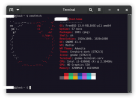The power settings like many others as well, are user specific. Therefore in the terminal I call
gsettings for each user separately.
sudo -u gdm dbus-launch gsettings set org.gnome.desktop.session idle-delay 0
sudo -u gdm dbus-launch gsettings set org.gnome.settings-daemon.plugins.power sleep-inactive-ac-type 'nothing'
sudo -u gdm dbus-launch gsettings set org.gnome.settings-daemon.plugins.power sleep-inactive-battery-type 'nothing'
sudo -u rolf dbus-launch gsettings set org.gnome.desktop.session idle-delay 0
sudo -u rolf dbus-launch gsettings set org.gnome.settings-daemon.plugins.power sleep-inactive-ac-type 'nothing'
sudo -u rolf dbus-launch gsettings set org.gnome.settings-daemon.plugins.power sleep-inactive-battery-type 'nothing'
sudo -u just_another_user dbus-launch gsettings set org.gnome.desktop.session idle-delay 0
sudo -u just_another_user dbus-launch gsettings set org.gnome.settings-daemon.plugins.power sleep-inactive-ac-type 'nothing'
sudo -u just_another_user dbus-launch gsettings set org.gnome.settings-daemon.plugins.power sleep-inactive-battery-type 'nothing'
etc.
In addition I had also problems with fast user switching and recovering from the screensaver (perhaps the same issue), and I disabled this as well on a per user basis:
sudo -u gdm dbus-launch gsettings set org.gnome.desktop.screensaver lock-enabled false
sudo -u gdm dbus-launch gsettings set org.gnome.desktop.lockdown disable-user-switching true
sudo -u gdm dbus-launch gsettings set org.gnome.desktop.screensaver user-switch-enabled false
sudo -u rolf dbus-launch gsettings set org.gnome.desktop.screensaver lock-enabled false
sudo -u rolf dbus-launch gsettings set org.gnome.desktop.lockdown disable-user-switching true
sudo -u rolf dbus-launch gsettings set org.gnome.desktop.screensaver user-switch-enabled false
...
In the latest packages we have already GNOME 42, and it comes with gdm-42. Upto then we stuck with the outdate gdm-3.28. I did not come to check the power, screensaver and user-switching issues with gdm-42, but it may well be that these are resolved now, like other issues have been resolved.
In order to switch to the latest packages, you want to add the configuration file
/usr/local/etc/pkg/repos/FreeBSD.conf:
Code:
FreeBSD: {
url: "pkg+https://pkg.FreeBSD.org/${ABI}/latest",
}
Then call
# pkg upgrade.



